|
|
|
Sort Order |
|
|
|
Items / Page
|
|
|
|
|
|
|
| Srl | Item |
| 1 |
ID:
143219
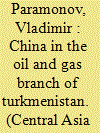

|
|
|
|
|
| Summary/Abstract |
In the 1990s, China showed practically no interest in Turkmen oil and gas. It developed this interest in the middle of the first decade of the twenty-first century and has been widening it ever since. In three years (2006-2009), Beijing built up its presence in Turkmenistan and, after the agreements of September 2013, became an uncontested leader in the Turkmen oil and gas industry.
|
|
|
|
|
|
|
|
|
|
|
|
|
|
|
|
| 2 |
ID:
143215
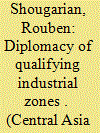

|
|
|
|
|
| Summary/Abstract |
The author investigates an alternative, indirect settlement between Armenia and Turkey expected to lead the negotiations out of the dead end into which they were pushed by the refusal of Ankara and Yerevan to ratify the Zürich Protocols. On the one hand, American-Swiss mediation and the shuttle diplomacy of 2008-2009, crowned by the sensational signing of the Turkish-Armenian protocols, inflated international expectations. On the other, the euphoria created by what looked like a fundamental solution to one of the most complicated conflicts of the twentieth century proved to be short-lived.
|
|
|
|
|
|
|
|
|
|
|
|
|
|
|
|
| 3 |
ID:
143216
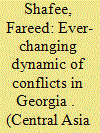

|
|
|
|
|
| Summary/Abstract |
In this article, I will trace the dynamics and changes in internal conflicts in Georgia (Georgian-Ossetian and Georgian-Abkhazian conflicts), and investigate the role of external factors and their interplay with internal factors affecting the dynamic of the conflicts. Mainstream academic literature views the two conflicts as internal. However, after the war in August 2008 that saw visible intervention from Russia, the conflicts, I argue, have turned into intra-state conflict between Georgia and Russia. My further argument is about the decisive role of external factors in the conflicts. The Western and Georgian media tend to emphasize the role of Russia in the conflicts; academic literature is divided over the issue of the influence of external factors. I acknowledge that sometimes Russia’s role is exaggerated and that less attention is paid, particularly in Georgia, to Tbilisi’s wrongdoings. However, overall, the presence and influence of external factors, on at least two occasions, modified the dynamic of the conflicts. Here, along with Russia, other outside players, such as the United States, contributed to the conflicts.
|
|
|
|
|
|
|
|
|
|
|
|
|
|
|
|
| 4 |
ID:
143211
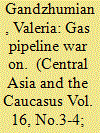

|
|
|
|
|
| Summary/Abstract |
The current stage in international relations is characterized by rapid intensification of competition in the energy sphere. The Russian-Ukrainian gas crisis of 2008-2009, as well as the conflict around Ukraine at the current stage are pushing energy supply security, one of the most important concepts in scientific literature, into the foreground. The primary importance of this concept in the increasingly unstable and rapidly changing global economy is promoting the creation of new geopolitical and geo-economic advantages for the transit countries. Moreover, uninterrupted production and safe transportation of oil and natural gas are becoming important for guaranteeing the stability of the largest economies.
|
|
|
|
|
|
|
|
|
|
|
|
|
|
|
|
| 5 |
ID:
143218


|
|
|
|
|
| Summary/Abstract |
This article examines the problems of increasing the self-sufficiency of the Georgian economy through an improvement in its sectoral structure, diversification and expansion of exports, and increased import substitution. In this context, the author explores the concept of structural effect (mainly its sectoral-structure aspects) and the methods of its evaluation. The focus here is on evaluating the level of national economic self-sufficiency.
|
|
|
|
|
|
|
|
|
|
|
|
|
|
|
|
| 6 |
ID:
143217
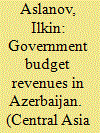

|
|
|
|
|
| Summary/Abstract |
This article examines the two main sources of the state budget in Azerbaijan: taxes and oil revenues. In particular, it analyzes variously measured indicators of the tax burden on the Azerbaijan economy compared to other countries in the region and the world, assesses, based on a regression model, the role of the oil factor in generating revenue for the budget, and explores various scenarios for evaluating the sustainability of government budget revenues in the medium term. Based on his assessments, the author shows that steady growth of the non-oil sector by 7%-9% per year is a major condition for maintaining the stability of government revenues in the medium term.
|
|
|
|
|
|
|
|
|
|
|
|
|
|
|
|
| 7 |
ID:
143210
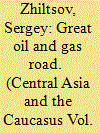

|
|
|
|
|
| Summary/Abstract |
The geopolitical changes associated with the collapse of the Soviet Union and the emergence of the newly independent states in its territory have led to the appearance of a large number of new pipeline projects. Some of the new projects concerned the delivery of oil and gas in the European (westerly) direction, while others were aimed at creating infrastructure for exporting hydrocarbon resources in the easterly direction—from the Central Asian countries to China.
|
|
|
|
|
|
|
|
|
|
|
|
|
|
|
|
| 8 |
ID:
143220
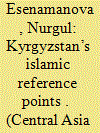

|
|
|
|
|
| Summary/Abstract |
This article examines Kyrgyzstan’s Islamic reference points that formed under the influence of the Islamic movements coming from Turkey, Saudi Arabia, Iran, and the states of the Indian Peninsula. It identifies the institutionalization aspects of these Islamic movements and how Kyrgyz society perceives them.
|
|
|
|
|
|
|
|
|
|
|
|
|
|
|
|
| 9 |
ID:
143208
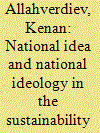

|
|
|
|
|
| Summary/Abstract |
The author investigates the correlative ties between the categories “national idea” and “national ideology” and their impact on the ethnocultural identity of peoples in the context of the contradictory processes at the current stage of globalization.
|
|
|
|
|
|
|
|
|
|
|
|
|
|
|
|
| 10 |
ID:
143209
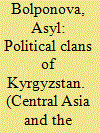

|
|
|
|
|
| Summary/Abstract |
The author traces the history of the clan system and its evolution as part of the political processes unfolding in Kyrgyzstan. She relies on facts to demonstrate that the clan system of our days is a product of classical unification of tribes into clans.
|
|
|
|
|
|
|
|
|
|
|
|
|
|
|
|
| 11 |
ID:
143207
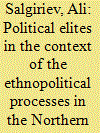

|
|
|
|
|
| Summary/Abstract |
The main role in these processes belongs to the local ethnopolitical elite (regional heads and their closest circles, business elites, clergy, etc.), who also rely on traditional ethnic institutions, national culture and time-honored practices, another source of influence on the masses. The federal Center has to take into account the interests of the ethnopolitical elites rooted in clan, family, and teip solidarity and realized through informal patron-client relationships. The elite’s closeness and durability are significantly slowing down the democratic processes in the region and interfering with the development of civil institutions.
|
|
|
|
|
|
|
|
|
|
|
|
|
|
|
|
| 12 |
ID:
143206


|
|
|
|
|
| Summary/Abstract |
The author approaches the course and results of the institutional transformations in the forms of government and electoral and party systems in Georgia and Armenia from the position of neo-constitutionalism. He relies on methods of comparative index analysis to identify the main models and trends of the political developments in these countries in the last fifteen years and analyzes in detail the constitutional changes and the way the new party and electoral systems took shape as the political regimes consolidated their positions.
|
|
|
|
|
|
|
|
|
|
|
|
|
|
|
|
| 13 |
ID:
143212
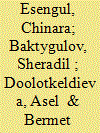

|
|
|
|
|
| Summary/Abstract |
The authors sum up the results of studies of regional cooperation in Central Asia and identify its main positive and negative factors. They assess, in particular, the political, economic, and cultural-humanitarian aspects of the present state of regional cooperation in Central Asia, analyze the problems related to border and water-energy issues, concentrate on the role the Kyrgyz Republic plays in regional cooperation, and point to its most promising trends.
|
|
|
|
|
|
|
|
|
|
|
|
|
|
|
|
| 14 |
ID:
143214


|
|
|
|
|
| Summary/Abstract |
The author analyzes different aspects of the “soft power” phenomenon—ideological, humanitarian and cultural—that the main geopolitical players use in post-Soviet Central Asia. He compares the “soft power” policy of the United States and the Russian Federation and their key parameters: its ideologies and values; the tools and institutions through which this policy is implemented; and the target social and other groups that, under the impact of “soft power,” become its convinced supporters and promote it in their countries.
|
|
|
|
|
|
|
|
|
|
|
|
|
|
|
|
| 15 |
ID:
143213


|
|
|
|
|
| Summary/Abstract |
This article analyzes Tajikistan’s relations with the People’s Republic of China (PRC) in the almost twenty-five years since direct and broad relations were restored between the two countries in the context of two overlapping trends. One of them is the striving of the Tajik leadership to acquire a reliable source of foreign funding for the republic’s economic development in light of its own extremely limited financial resources. The second is the consistent implementation by the Chinese leadership of reciprocal economic-political strategies—the New Silk Road, Going Out, and the Silk Road Economic Belt.
|
|
|
|
|
|
|
|
|
|
|
|
|
|
|
|
|
|
|
|
|